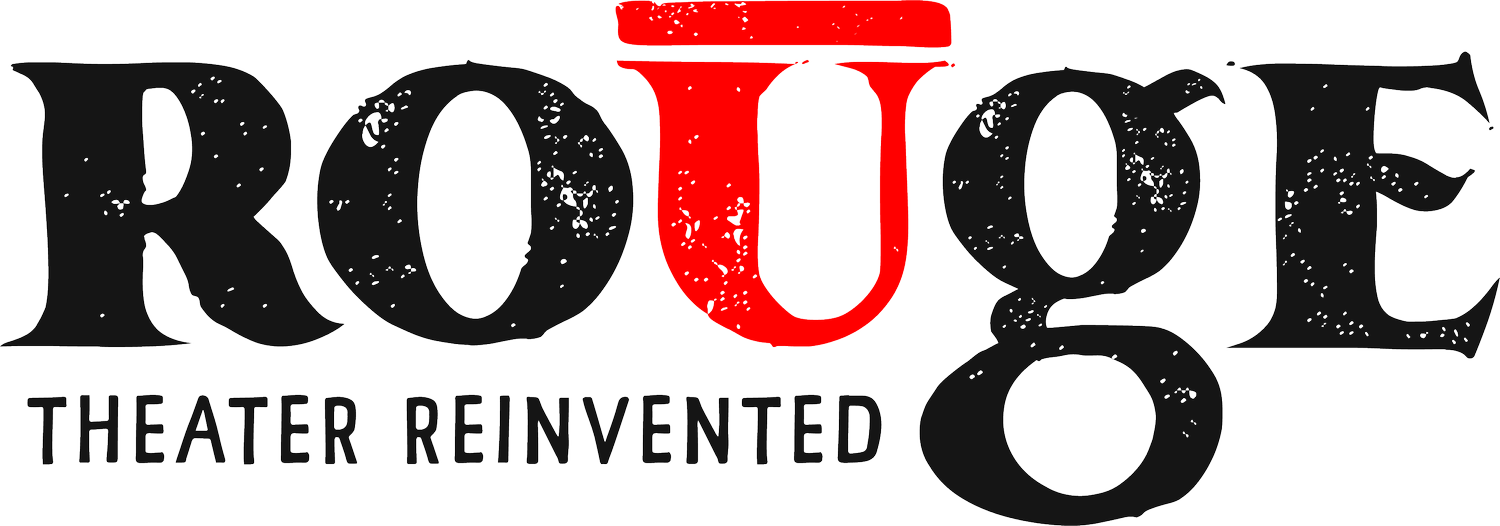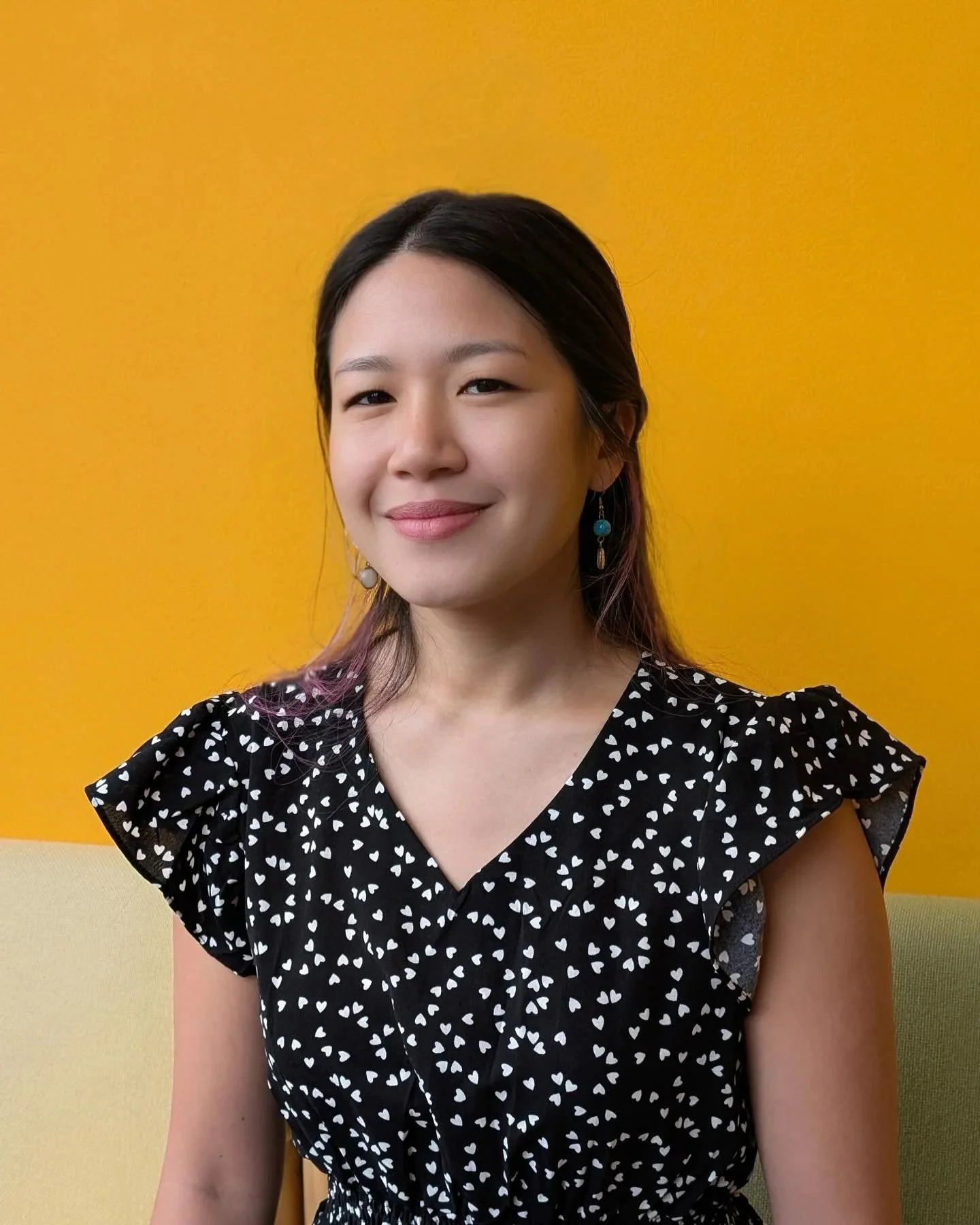
Spotlighting Oral Histories from our Community
The ROŪGE
Filipino American Story Collection Project
The production grew in tandem with a story-collection project capturing Filipino American experiences — from migration journeys to community folklore. Supported by a Virginia Humanities at WHRO grant, ROŪGE welcomed local musician and storyteller Maya Pagtakhan to lead the effort, gathering oral histories from Hampton Roads’ Filipino community while the pageant was being created. The energy, humor, and resilience in these stories influenced the very conditions of the play’s development. They will be shared in a lobby exhibit during performances, preserved at the ODU Special Collection and University Archive.
Marianne Chan | Story Collector
A local poet and scholar, teaching poetry and nonfiction writing at Old Dominion University. She became connected to the production through the ODU Literary Festival’s partnership with ROŪGE and has been excited to grow and provide guidance for the management and curation of this story archive.
After she earned her B.A. in English from Michigan State University, she went on to study poetry at the University of Nevada, Las Vegas, where she earned her MFA. She earned her Ph.D. in Creative Writing & Literature from the University of Cincinnati in 2023.
“Being a part of the GFAAP project has been unexpectedly enlightening. Initially, only assisting with the Filipino story collection project that supplements the show, I had a chance to meet dozens of Filipinos in Hampton Roads to talk about their stories and what it means to be Filipino American. Reflecting on my childhood, I see so many stages of my upbringing where I felt isolated or ashamed to have skin and features that look so starkly different from my peers. My family wasn't particularly involved in the larger Filipino community that is nestled into Hampton Roads, but I remember attending big Filipino parties and celebrations with my Lola (grandmother) and Lolo (grandfather). Attending those large yet intimate celebrations is what rehearsal has felt like thus far, now that I've joined the cast as Marisol Magindara. It feels like home, and it feels like a family gathering - every single night. I know that this feeling of home will reach our audience.”
Maya Pagtakhan | Lead Story Collector
The following interviews and reflections were collected during the development of The Great Filipino American ASWANG Pageant. These personal stories, shared by members of the local Filipino American community, offer insight into identity, heritage, and belonging.
Jimel “Baby Rain-a” Iglesia
Norfolk
“[Being Filipino American] is a balancing act. I think that naturally, [Filipino people] have a collectivist culture. So being [a part of] collectivist culture, you’re really selfless, hospitable, and taught the importance of legacy and having responsibility to always consider your close ones and your loved ones around you… The way we love is very deep… The balancing act of being here in America, you learn about your individuality and naturally want to lean more into that and we kind of just want to think outside of the box of what we were taught. It’s having this beautiful, selfless soul – but also wanting to break free of the bounds of what’s expected of us.”
Ana Ruby
Virginia Beach
“I would say the Filipino spirit is like bamboo: bending in the storm, but never breaking. We’re rooted in culture, we’re helpful, we’re original. I feel like the Filipino spirit is just community-based and universal… I hope that more visibility [will] be presented, not just behind the camera, but in the leadership in the boardroom… More representation just everywhere because Filipinos are a big part of history everywhere.”
Anna Christine Velez Sosa
ROŪGE | Norfolk
“There’s just something very distinctive that I can’t quite verbalize [about the Filipino spirit]. Filipinos truly do quite physically carry home with them in a way that it can exude itself in a feeling of magic. You know, it can feel that ethereal, but it also can feel quite concrete at times, you’re slamming yourself up against it. And a lot of times, it’s for the good because – especially in these times – it can feel like you’re on shaky ground. So it’s good to know that it’s inside of you regardless.”
Rosanna Pagtakhan
Recreational Therapist | Smithfield
“Recently over the last year and a half, I would say – for me – it’s about being more comfortable being Filipino. I’ve never had that issue before I moved [to Smithfield] honestly, because where I grew up in New Jersey, [there was a] massive Filipino population. We had Filipino day camp that was a regular thing, so everyone I grew up around, it was predominantly Asian, so I wasn’t a minority there. Then I moved to the south and encounter a lot of different cultures than in New Jersey and New York. So for me, right now, I think it’s just embracing it more and trying to find more sense of community.”
Erene Henninger
Project Seed | Virginia Beach
“When I got married and then we had a kid, I realized that I have to pass on something to my daughter. She’s half white, half Filipino – but she has to know where her roots are. Even though she hasn’t been to the Philippines yet, that’s why I’m doing all these things… Exposure to a lot of Filipinos, especially in this shop, is really good. Not just for me, but for my daughter.”
Justine Chan
Norfolk
“I feel like in this day and age, we are really lucky to be so well received in the community. And so I feel like we have a good baseline, generally. I just hope that we continue to be well-received, that our culture continues to be further explored by other people that are willing to explore that. And I hope that people can see all the hard work that our families and our families before us have put in, and that they can recognize how much effort and love and life that we contribute to the community.”
Angelina & Gemma Paquin
Virginia Beach
“Why would I feel ashamed about something that I can’t change? This is my blood. This is my skin. This is who I am. I should feel nothing but proud about that. And my mom’s reminded me of that, too… Being Filipino American – it motivates me to be brave and courageous… There are times where I feel like I’m not Filipino enough, especially since I don’t speak Tagalog. But when I’m around my mom, I’m like, you know what? Regardless of how Filipino I may feel, I know that I’m Filipino and I’m always going to be proud of that.”
Dr. Luisa A. Igloria
Old Dominion University | Norfolk
“What I’m more curious about is what they were before they turned into monsters… As someone who has done some scholarship on Philippine history and culture, I relate that to the time in our colonial history when, for instance, the babaylan, or the indigenous spirit leaders of our communities, were banished to the outskirts with the advent of institutionalized religion… So [Spanish colonizers] supplanted what we knew then of indigenous worship and prayer and sacrifice with something much more in keeping with the Roman Catholic faith. So I feel like their conversion… into the form of monstrosity has something to do with the way in which colonization drove out our indigenous systems of belief and turned them into things that were supposed to be demonic in order to validate the new systems that came into place to take their place.”
Rosemarie Ann Spracklin
Artistry by Rosemarie | Virginia Beach
“I know this is cliche, but [being Filipino-American] makes me proud. I really do feel that sense of family, you know? Everyone’s an auntie, everyone’s an uncle, they’re my cousins. It’s something that’s unspoken, like a camaraderie… And my siblings, my elders – just the community – I feel have raised the bar. That’s where the sense of pride of being Filipino American comes from, so I also want to raise the bar, but in my field – the unconventional route. It’s been a blessing to hear my mom say ‘All my kids are professionals.’”
Noah “Noah-O” Oddo
Charged Up Entertainment | Richmond
“The things I've been able to do are only possible because of who came before me and sacrifices and choices they made. So, it means a lot to me to be able to be representative like a lot of spaces I've been in, especially in rap… People had a lot of questions like, ‘Oh, I've never met a Filipino. I never [knew they existed]..’ So, it's like already there's some skepticism as far as like, should I be in these spaces? Is my skill level, you know, worthy to be in these places? And so it means a lot to me and I feel like I carry that responsibility to push and it's pushed me even harder to excel… [Being Filipino American] means that I always do my best and do it for the people before me who made it possible for me to be here and sacrifice… to honor them by doing the best I can. … it means everything to me.”
The Minson Family
Virginia Beach
I always make example, my grandchildren, I always see them, I hope they will continue this tradition. They can say, "Oh, remember when we used to go to Lola's house, we used to play Zunka? Oh, we used to cook this and play games?" I want that. And then, intertwine the American and the Filipino culture at the same time, because you're in America, but not to forget being a Filipino.
Hannah Estrella Agot Bondoc
ROŪGE | Norfolk
The future that I’m hoping for is something that I think we’ve already been manifesting, I would say, which gives me a lot of hope. There are a lot more [second generation Filipino-Americans], younger people within the Filipino communities leaning more into their roots, making their own communities… I think that is the future that I’m hoping for, where we have a big enough and palpable enough community that we can comfortably lean on each other and not feel like we are alone.
Nicolas Lundy
Norfolk
On top, I guess. On top. I feel like in Virginia, there's a lot of us out here for sure, but I think we're still underrated in a sense. I feel like we still don't get the light shine on us as we should. You have your Manny Pacquiaos and stuff like that out there, but I feel like there's so much talent within our culture and in the country that it could be more widespread, and I feel like there just could be more light shined on everyone. So yeah, that's what I hope for. And I think it will happen, and I think there's always just room for progression for us.
Videos of this archive have been edited and managed by Reggie Callanta & Julian Dysangco
Contribute to the Archive!
This living archive will continue to multiply with stories after our production has concluded. Submit your stories, oral histories, tales of ASWANG lore, or share what it means to be a Filipino American in our home of Hampton Roads. Story submissions still accepted down below!


